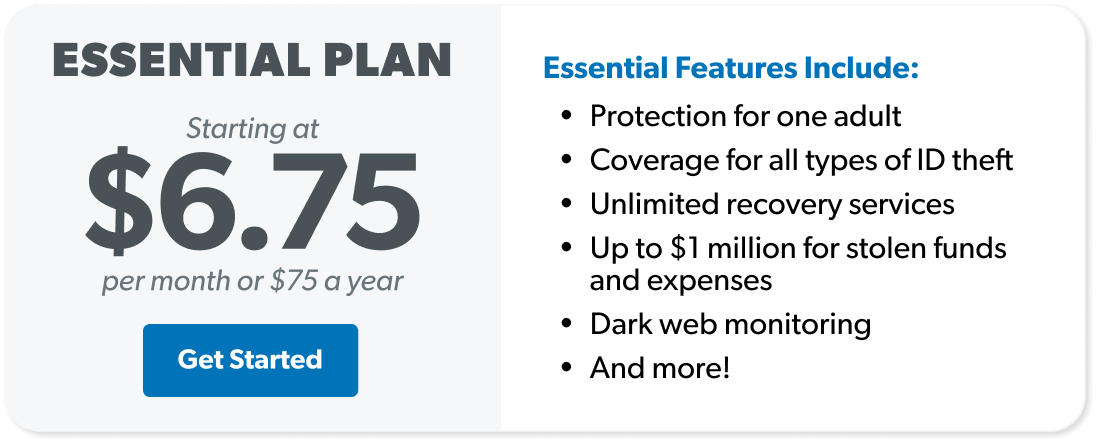Job Scams: Warning Signs to Watch For
12 Min Read | Mar 17, 2025

We’ve all seen them: A piece of paper on a bathroom stall, an email we didn’t ask for, an ad on social media that promises easy money for work that requires no skill. Maybe you’ve even applied for a job not realizing it was a scam!
Some job scams are easy to spot while others could fool anyone at first glance. But nobody looking for a serious job to push their career forward deserves to be taken in. I’m a big believer in being strategic with your job search so I’m going to walk you through common job scams and how to avoid them.
How to Tell if a Job Is a Scam
Here’s the unfortunate truth, folks. When scammers post fake job ads, they’re hoping to get your personal info so they can steal your identity. Sometimes it’s worse, like they’re running a human trafficking ring. Either way, there are tons of signs you can look for to figure out if this opportunity is the next step in your career or a big, fat scam (not to mention a waste of time).
Too Good To Be True
Many job scams offer outrageously good pay for jobs requiring little experience and few hours. So, if it sounds too good to be true, guess what? It probably is! If the job ad you’re looking at promises $400 a day for only five hours of work—no experience needed!—run.
Poor Grammar and Spelling
Bad grammar and poor spelling are an easy giveaway. If the ad says something like, “We expanding our business opportunities to new horizons and look to give this opportunity to people watching for a fulfilling job witch makes you full,” don’t apply! A legit job post will make sense and use good grammar and spelling.
Worried about the newest data breaches? You can take control today.
Look for this tell in any communication you receive as well. The job listing may have looked legit, but if the person communicating with you can’t string a proper sentence together, that’s a major red flag.
Too Urgent
Scammers often offer the job way too early in the interview process (think the first phone call or email) and push hard for you to accept the offer immediately. No legitimate company wants to hire someone without a thorough interview process. A recruiter for a real job opportunity will make sure you and the company are a good fit for each other.
No Request for Work Verification
This one’s similar to the last red flag. Part of a thorough interview process is asking for and verifying work references. If the company you’re applying at isn’t concerned about verifying your work experience, they probably aren’t concerned with the law or giving you a real job either.
Extremely Vague Job Description
Another surefire way to sniff out a scam is to pay attention to whether the job description actually describes the job! If the listing goes on and on about how much money you can make and how easy it will be, but nothing about what you’ll actually be doing, it’s a scam.
Unsolicited Job Opportunity
Did you get an email thanking you for your email query about a job and telling you they have a position open? Or a letter in the mail telling you about a job opportunity that’s just too good to pass up? Don’t fall for it. If you never sent an email or inquiry, they bought your address from someone shady and are just waiting for you to write back with personal information they can use to steal from you.
Generic Email Address
Pay attention to the email address of the recruiter you’re communicating with. If they work for a legitimate company, their email address should belong to the company (jessicacalinas@companyname.com) not Gmail or some other generic address. If you’re receiving communication from a generic email address, steer clear.
Fake URL
Many scammers post fake job listings for real companies. These days it’s easy to forge a company website and email template to trick an unsuspecting job seeker. If you’re asked to apply online at a company’s website, take a close look at the URL. If it has anything suspicious in it, that’s a red flag. It doesn’t have to be extreme—it can be as subtle as www.company-name.com instead of www.companyname.com. Look out for extra dashes or letters that aren’t supposed to be there or foreign addresses added onto the end (like .eu or .au).
Interview Is Over Chat
No company worth its salt will conduct an interview over text or a chat service. If someone asks to interview you via text, that’s a sign to steer clear. A real job interview will happen over the phone, in person and/or potentially on Zoom if the job is out of state or remote.
Asks You to Pay
Sometimes the scam is up front—they just want you to give them money, not your personal information. They tell you they have a job for you, but first you need to pay for training or certification before starting work. Of course, once they have your payment of $39.95 for onboarding supplies in the bag, they and the job that never existed disappear. Poof!
Asks for Your SSN
We all expect to give our Social Security number, address and banking info to our employer when we start a new job. But when a scammer asks for our information in the beginning of a fake interview, we might not think twice before handing it over. But don’t fall for it, people! You can tell this is a scam tactic because it happens too early in the process. You should never be asked for your SSN during interviews.

What's your risk of identity theft?
Take this quiz to assess your risk.
Common Job Scams
Scammers aren’t always creative. Often, they follow the same setup other scammers have already tried. But if you know what they are, you don’t have to fall for them. While you’re out there searching for a meaningful job, be on the lookout for these types of common scams.
Pyramid Scheme
This might be the biggest one out there. Everybody’s heard of pyramid schemes, but what are they? To keep the scheme afloat, the people involved have to convince other people to join. Joining always requires buying in, and that money makes the scheme look like a profitable business. As long as people keep paying to join, the scheme keeps going.
Sometimes the scheme actually sells a product as well, but that’s not where profits come from.
An example of a pyramid scheme is Big Co-op Inc., which operated out of California in the early 2000s. Set up as an internet shopping website, Big Co-op actually made its money selling licenses and memberships to participants. As a participant, you would pay dues for your membership and then pay for the privilege to sell Big Co-op stuff to others and make a commission. Then you would convince others to buy a membership and license as well (you’d make a commission off that too) and the cycle would continue.
This could’ve been a legit business if Big Co-op made their money from selling actual products, but they made all their “profits” from selling licenses (to sell more licenses to sell more licenses).
Multi-Level Marketing (MLM)
You might be surprised to hear this, but multi-level marketing (MLM) isn’t actually a scam . . . always. These business models look very similar to the pyramid scheme model, but with one key difference: MLMs actually sell products and make their profits from those sales.
Also called network marketing or direct marketing, these businesses operate by selling their stuff directly to the consumer through person-to-person sales rather than a store or website. Participants who make the most money in MLMs are those who transition to the role of recruiter. MLMs are a high turnover sales environment (most people who join an MLM don’t last long), so you must be good at recruiting salespeople.
A few of the oldest or best known MLMs are Amway, doTERRA, Beautycounter, and Avon.
But many pyramid schemes masquerade as MLMs, so you have to pay attention, folks. Remember those leggings with deafening prints of hot dogs and sunflowers plastered all over your Facebook feed by friends repping LuLaRoe? (No? Then you were spared.) That company was accused of operating a pyramid scheme and ended up paying $4.75 million to thousands of consultants who got taken in thinking they were joining a legit MLM.1
The thing about LuLaRoe is it rode the line between legit business and scam (it’s technically still in business today). And that’s the thing with MLMs. Sometimes they can be a legal business . . . and awful. Many use marketing tactics that promise to take you to the moon and back but don’t deliver.
If you’re seriously considering joining one, make sure you look at their compensation plan, google what others are saying (make sure to include keywords like “scam”), have a sales plan, and are absolutely clear on what you’re signing up for.
Stuffing Envelopes
Get paid hundreds of dollars to put circulars in envelopes and mail them from home? Gee whiz, sounds like a deal! Hang on—this is one of the oldest scams in the book. It operates very similarly to a pyramid scheme: Participants pay a fee for the startup kit (envelopes, stamps, etc.) and then are told how they can make money getting others to sign up.
Online Data Entry
This one makes me really mad because it targets people like single moms who just want to be home with their kids and make decent money at the same time. But listen, don’t fall for the ads that say you can make hundreds of dollars a day from home entering data into a computer. Data entry is a legitimate job, but it will not pay you like a CEO. If the job opportunity you’re looking at says anything about making you rich, run for the hills. There are plenty of legitimate work from home jobs that will pay you well and can work around your family schedule.
Personal Assistant Scams
Often scammers will pretend to be important world-traveling businessmen in need of a personal assistant to hold the fort down back home. They advertise a personal assistant job that will pay well and provide all the funds required to carry out the various tasks they need you to do (like mail this or buy that).
If you fall for it, they send you a check that more than covers the costs and then ask you to reimburse them for the extra. But after a few days, it turns out their check bounces, and you’re left with no job and an emptier bank account.
Reshipping Scams
Ever wonder how thieves unload their stolen goods? Sometimes it’s through a job search scam. They “hire” unsuspecting people to repackage and ship stolen merchandise from their homes. Of course, payment never materializes, and those workers unknowingly get turned into criminals themselves!
Interested in learning more about identity theft?
Sign up to receive helpful guidance and tools.
How to Protect Yourself From Job Scams
Just because all these scams are out there doesn’t mean you have to be scared to make a move and look for your next step in your career. Knowledge is power. Now that you know what to keep an eye out for, we can take a look at some ways to protect yourself from job scams.
Respect Your Sixth Sense
If the little hairs on the back of your neck are dancing, there’s probably a good reason. If you don’t respond to a potentially fake ad, what’s the worst that could happen, anyway? You miss out on a good opportunity. And if you do respond? Your identity is stolen, and you’re stuck cleaning up a mess for months.
Go with your gut—it’s just not worth the risk otherwise.
Ask for More Information
If you’ve got a recruiter chatting you up but they’re being vague about the job, try pushing them for more details. This is kind of fun because I love a good confrontation—and if it’s a scam, that recruiter is not going to like it. They’ll dry up and run faster than you can say “scammer!”
Do Your Research
Go ahead and do your own reference check. Vet the company and job posting by doing an internet search on the company supposedly offering the job. Make sure to search it with the keywords “scam” and “fraud” as well. If it’s a well-known company, google search them and compare their website URL with the URL provided by the job post. If you’re still not sure, reach out to the real company and ask them if they contacted you.
If the job compensation seems off to you (too high), look up the going rate for the kind of job on offer. Average job salaries are readily available online.
Buy Protection
If all this talk of scams has you feeling vulnerable, that’s fair. In 2020, 4.7 million adults reported identity theft and fraud.2 But, my friends, you don’t have to worry. RamseyTrusted provider Zander Insurance will monitor your sensitive data and keep you secure—even if, despite all your best efforts, a job scam hoodwinks you. Don’t let scammers get in the way of finding a fulfilling career.
Connect with Zander today to put a million dollars in identity theft coverage between you and those scammers out to get you.




